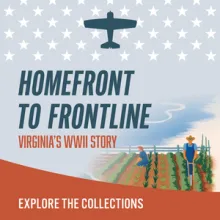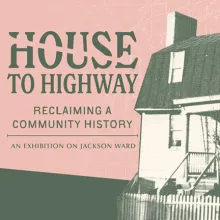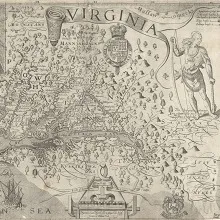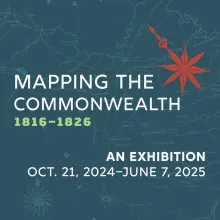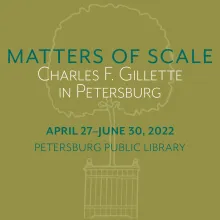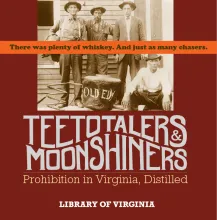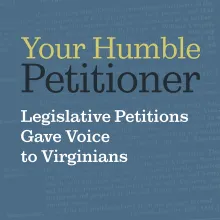"Homefront to Frontline: Virginia's WWII Story," a lobby display, online exhibition and a collection of online resources commemorating the 80th anniversary of World War II, brings to life the experiences of those who served in the military as well as those who supported the war effort at home. The lobby display runs through November 14, 2025, with content rotating in June.
Exhibitions: Past and Present
Physical Exhibition:
-
The Library's free exhibition on the history of Richmond's Jackson Ward neighborhood, "House to Highway: Reclaiming a Community History," will explore the historic district that was once the center of Richmond’s Black community through the lens of the Skipwith-Roper family. Using a combination of archival records, maps and photographs from the Library’s collection, the exhibition covers a period from 1767 through the 1950s, when eminent domain displaced many residents and businesses of Jackson Ward for the construction of the Richmond-Petersburg Turnpike.
The exhibition is presented in partnership with The JXN Project (JXN), a historic preservation nonprofit organization dedicated to capturing the pivotal role of the ward in the Black American experience as one of the country’s first historically registered Black urban neighborhoods.
The exhibition is presented in partnership with The JXN Project (JXN), a historic preservation nonprofit organization dedicated to capturing the pivotal role of the ward in the Black American experience as one of the country’s first historically registered Black urban neighborhoods.
Physical Exhibition:
-
Traveling from
through
Indigenous Perspectives at the Library of Virginia examines aspects of our collections through the lenses of the eleven federally and state-recognized Virginia tribes. In these interviews, tribal citizens offer reflections on our exhibition themes of retaining tribal culture, identity, resistance, tribal sovereignty, the land and environment, and the future of Virginia’s tribes that enlarge our understanding of documents in the Library’s collections.
"Mapping the Commonwealth" presents examples from 40 manuscript maps that highlight the painstaking task of creating Virginia's first official state map. Combining art and science, these surveys attest to the dedication, skill and stamina of surveying teams who worked without the benefit of GPS and today's technology.
Matters of Scale: Charles F. Gillette in Petersburg
Physical Exhibition:
-
Petersburg Public Library, 201 West Washington Street, Petersburg, 23803
The Petersburg Garden Club, Petersburg Public Library, and the Library of Virginia present the exhibition Matters of Scale: Charles F. Gillette in Petersburg, which celebrates the work of the renowned landscape architect, April 27–June 30, 2022. From the 1920s through the 1960s, Gillette's name was synonymous with the best landscape design in the upper South. Although he is most remembered for his private estate work, Gillette's Petersburg designs serve as a microcosm of his broader career, encompassing residential, corporate, and large-scale educational projects. Drawn extensively from the Charles F. Gillette Papers at the Library of Virginia, the exhibition includes garden designs, photographs, and client correspondence that have never been publicly displayed before, as well as a recently restored Gillette bench. Projects such as Virginia State University, Blandford Cemetery, and the private gardens of Petersburg residents George Cameron, C. L. Morris, and W. R. Seward incorporate many of what would later become recognized as Gillette's signature details, including highly crafted masonry construction, carefully selected garden statuary, and an overall concern for proportion and scale.
Matters of Scale: Charles F. Gillette in Petersburg will on display April 27–June 30, 2022, at the Petersburg Public Library, 201 West Washington Street, Petersburg, Virginia 23803, which is open Monday, Wednesday, Friday, and Saturday 10:00 AM–5:00 PM, and Tuesday and Thursday 1:00–8:00 PM. For more information, visit www.ppls.org or call 804.733.2387.
The exhibition will also be part of the Petersburg Garden Tour on April 26, 2022, the day before it opens to the public. Visit www.vagardenweek.org/tours for information and tickets. The Garden Club of Virginia's Historic Garden Week runs April 23–30, 2022.
The Petersburg Garden Club, Petersburg Public Library, and the Library of Virginia present the exhibition Matters of Scale: Charles F. Gillette in Petersburg, which celebrates the work of the renowned landscape architect, April 27–June 30, 2022. From the 1920s through the 1960s, Gillette's name was synonymous with the best landscape design in the upper South. Although he is most remembered for his private estate work, Gillette's Petersburg designs serve as a microcosm of his broader career, encompassing residential, corporate, and large-scale educational projects. Drawn extensively from the Charles F. Gillette Papers at the Library of Virginia, the exhibition includes garden designs, photographs, and client correspondence that have never been publicly displayed before, as well as a recently restored Gillette bench. Projects such as Virginia State University, Blandford Cemetery, and the private gardens of Petersburg residents George Cameron, C. L. Morris, and W. R. Seward incorporate many of what would later become recognized as Gillette's signature details, including highly crafted masonry construction, carefully selected garden statuary, and an overall concern for proportion and scale.
Matters of Scale: Charles F. Gillette in Petersburg will on display April 27–June 30, 2022, at the Petersburg Public Library, 201 West Washington Street, Petersburg, Virginia 23803, which is open Monday, Wednesday, Friday, and Saturday 10:00 AM–5:00 PM, and Tuesday and Thursday 1:00–8:00 PM. For more information, visit www.ppls.org or call 804.733.2387.
The exhibition will also be part of the Petersburg Garden Tour on April 26, 2022, the day before it opens to the public. Visit www.vagardenweek.org/tours for information and tickets. The Garden Club of Virginia's Historic Garden Week runs April 23–30, 2022.
Physical Exhibition:
-
Traveling from
through
Virginians imbibed their last legal drink on Halloween night in 1916-more than three years before national Prohibition was enacted. Teetotalers & Moonshiners: Prohibition in Virginia, Distilled tells the story of Virginia Prohibition and its legacy, including the establishment of Virginia's Department of Alcohol Beverage Control and NASCAR. Newsreels of still-busting raids, music from the Jazz Age, and vintage stills complement the archival record of the exploits of Virginia's Prohibition Commission. Supported in part by the Virginia Department of Alcoholic Beverage Control and the National Alcohol Beverage Control Association. Style Weekly is the print media sponsor.
For more information about the traveling version of this exhibition, available in summer 2017, please contact Barbara C. Batson, exhibitions coordinator, at barbara.batson@lva.virginia.gov. To view the current itinerary for this exhibit, please click here.
Check out our blog "UncommonWealth" to read more about Prohibition records at the Library of Virginia.
For more information about the traveling version of this exhibition, available in summer 2017, please contact Barbara C. Batson, exhibitions coordinator, at barbara.batson@lva.virginia.gov. To view the current itinerary for this exhibit, please click here.
Check out our blog "UncommonWealth" to read more about Prohibition records at the Library of Virginia.
Imagine having to explain to the House of Delegates why you want to divorce your spouse, or change your name, or take other actions that affect your life. Virginians had to do just that for nearly a century. Their stories can be found in the Library's Legislative Petitions Collection.
During the years between the American Revolution and the Civil War, Virginians submitted petitions to the General Assembly to bring local or personal issues to the attention of their legislators. The Library's collection of nearly 25,000 petitions reveals how Virginians communicated their concerns on a wide range of topics. To obtain legal permission to operate a ferry, maintain a tavern, or carry out many other activities, residents of the commonwealth were required to introduce a petition into the House of Delegates to begin the process of acceptance or rejection. The right to petition was not restricted by class, race, or sex. Your Humble Petitioner highlights petitions that involved deeply personal issues such as divorce and requests by emancipated Black people to remain in the commonwealth, offering a glimpse into the realities of 18th- and 19th-century life.
The right of citizens to petition their government is an ancient one, dating back indirectly to the Great Charter (Magna Carta) from 1215 and in the First Amendment to the U.S. Constitution. Even today, citizens of Virginia exercise their right to petition their government.
During the years between the American Revolution and the Civil War, Virginians submitted petitions to the General Assembly to bring local or personal issues to the attention of their legislators. The Library's collection of nearly 25,000 petitions reveals how Virginians communicated their concerns on a wide range of topics. To obtain legal permission to operate a ferry, maintain a tavern, or carry out many other activities, residents of the commonwealth were required to introduce a petition into the House of Delegates to begin the process of acceptance or rejection. The right to petition was not restricted by class, race, or sex. Your Humble Petitioner highlights petitions that involved deeply personal issues such as divorce and requests by emancipated Black people to remain in the commonwealth, offering a glimpse into the realities of 18th- and 19th-century life.
The right of citizens to petition their government is an ancient one, dating back indirectly to the Great Charter (Magna Carta) from 1215 and in the First Amendment to the U.S. Constitution. Even today, citizens of Virginia exercise their right to petition their government.

